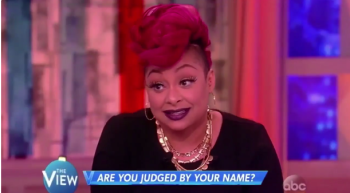“Are you judged by your name?” On Raven-Symoné and the Respectability Politics of “Black-Sounding” Names
Since becoming a co-host on the renowned talk show The View, Raven-Symoné has made her fair share of offensive comments, resulting in her receiving a lot of backlash on social media. From her comments about race to her jokes about not hiring “Watermelondrea,” let’s just say Raven has put her foot in her mouth far too many times.

While Raven-Symoné’s comments about “Watermelondrea” may have been for laughs and giggles, there is an unfortunate truth about names and racial biases.This is something that Black people with “Black-sounding” or “ethnic-sounding” names experience every day. According to Marianne Bertrand’s study, “Are Emily and Brendan More Employable than Lakisha and Jamal?”, applicants with “white-sounding” names were 50% more likely to be called back for an interview than applicants with “Black-sounding” names. Therefore, not only are Black people discriminated against in person, but we also face discrimination on paper.
This notion of racialized names and name discrimination is not only a form of internalized racism, but it has further perpetuated respectability politics. What Raven-Symoné and many others fail to realize is that these “ghetto” names are embedded with meanings and, most importantly, they are an essential part of one’s identity.
Although Raven-Symoné has since “apologized,” her comments about names have caused me to reflect on my own. As a Black woman with a unique name, and, perhaps, even a “Black-sounding name,” I think about my experiences with my name. I think about the micro-aggressive comments, the constant explanations, and the people that refuse to learn how to pronounce it. Where is that from? What does it mean? Or there’s my favorite, I’m never going to say that right. Do you have a nickname? also known as ‘I really don’t want to learn how to pronounce your name, so I’m going to try to find a shortcut.’
Yes, I have a nickname. No, you may not address me by it. My name is a part of me and, in my opinion, anyone who doesn’t care enough to learn it has shown me that they are not invested in me as a person.
I’ve learned that names can be a source of pride and frustration. I remember talking to my mother one day, who also has what may be considered a “Black-sounding” name. She told me about a family member telling her that she should change her name because “no one was going to hire her.” She was honest with me and told me that she contemplated it for a while, but, ultimately, opted for keeping the name she was given. Her name was a part of her identity that she was not willing to part with.
Respectability politics, like the scenario mentioned above, is a phenomenon that has become prevalent in our community. From making fun of a name’s spelling to adopting names or nicknames that are not associated with Blackness, people are feeling the need to police themselves and their names in order to feel accepted.
I’d be lying if I said I never think about how things would be had I been given a “white-sounding” name. My name wouldn’t delay attendance-taking in class, Starbucks transactions would be much shorter, and I’d finally be able to find a souvenir key chain with my name on it, but it wouldn’t be me. My name has been something that I have taken pride in long before I experienced discrimination because of it. My name has meaning and it’s an important part of my identity and my story. It wouldn’t feel right going by another name because, quite frankly, my name is me.
Instead of shaming people with unique or “Black-sounding” names or policing ourselves, we should learn to embrace the names we were given and the culture embedded in them. Our names are an important part of us, they matter, and so do we.
Posted: December 7, 2015, 9:15 AM